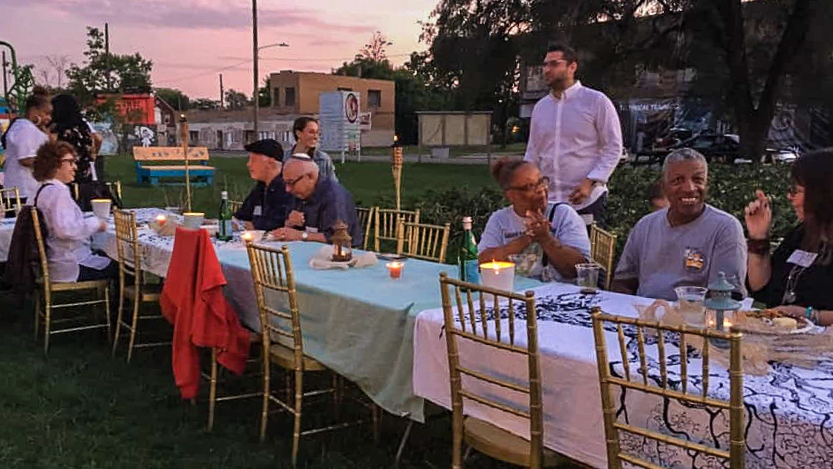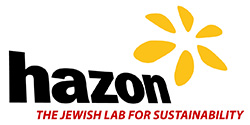
An event held at the Oakland Avenue Urban Farm, for which Hazon is a supporting partner. (Lottie Spady/Hazon)

An event held at the Oakland Avenue Urban Farm, for which Hazon is a supporting partner. (Lottie Spady/Hazon)
Religion can be a powerful force in people’s lives, a source of community and moral guide. It has the power to gather people and move them towards collective action in an issue such as the climate crisis. In the Jewish community, Hazon (the Hebrew word for “vision”) is an organization doing this work.
 Founded in 2000 by Nigel Savage, Hazon has impacted thousands upon thousands of people, Jewish and non-Jewish, across the United States and Israel as the “largest faith-based environmental organization in the U.S.” Their work takes many forms and contexts over the last twenty years as they continue to be a resource and teacher to the Jewish community on the path to sustainability. Hazon’s mission is deeply rooted in the Jewish value of tikkun olam, repairing the world, as evidenced by their mission statement: “We are in a global environmental crisis. Jewish tradition compels us to respond.” Calling themselves “The Jewish Lab for Sustainability,” Hazon uses Jewish traditions and values, innovation, education, and community to bring environmentalism into the Jewish community.
Founded in 2000 by Nigel Savage, Hazon has impacted thousands upon thousands of people, Jewish and non-Jewish, across the United States and Israel as the “largest faith-based environmental organization in the U.S.” Their work takes many forms and contexts over the last twenty years as they continue to be a resource and teacher to the Jewish community on the path to sustainability. Hazon’s mission is deeply rooted in the Jewish value of tikkun olam, repairing the world, as evidenced by their mission statement: “We are in a global environmental crisis. Jewish tradition compels us to respond.” Calling themselves “The Jewish Lab for Sustainability,” Hazon uses Jewish traditions and values, innovation, education, and community to bring environmentalism into the Jewish community.
I spoke to two people who work at Hazon, Wren Hack, director of Hazon Detroit, and Shamu Sadeh, managing director of education at the Isabella Freedman Jewish Retreat Center in Falls Village, CT, to talk about their work and the work of Hazon as a whole.
Hazon has a presence in a number of cities across the country, including Detroit. Wren Hack calls Detroit a “lab for Hazon,” where they have the opportunity to “create and execute new programs here that we believe and hope will be replicable for other communities.” They have had several events focusing on local and sustainable food, grains and beans in particular. At an event last year called “Breaking Bread Together,” they were able to support a local farm and its regenerative farming practices by bringing in community members to learn about the grain they grow and the process of making bread, from grain to loaf. They also built an outdoor bread oven on the property and donated bags of flour and grains back to the community. Another group Hazon has worked with is the Oakland Avenue Urban Farm, a local nonprofit. Here, Hazon serves as a supporting partner, helping them to write grants and get funding for various projects. Hack talked about the role of Hazon in this case of asking what the community needs and making sure to really listen. Hazon is mostly made up of white suburbanites, and the farm is an urban, black community organization. They focus on providing support and resources, approaching from a place of building a relationship as neighbors, acknowledging the imbalances. With the successes of these and similar programs, they are looking at how they can be replicated in other communities.
The Hazon Jewish Food Festival is one of their most popular events every year. More than 7,000 people were in attendance in 2019. The main attraction, of course, is the food from local farms and vendors, but they also have sustainable arts and crafts, opportunities to learn about things like composting and rain barrels. It is a chance to expose many people to ideas and possibilities of sustainable food. Organizations who have participated in the Hazon Seal of Sustainability program, one of Hazon’s major national programs, and received the Seal of Sustainability also table at the event and have the opportunity to show the community what projects they are working on.
Hack also spoke on the Seal of Sustainability. Through this program, “sites” like synagogues, Jewish community centers, and Jewish day schools can undergo a series of audits that determine their sustainability strengths and weaknesses. From there, the site can choose an area they want to improve on and can receive a grant for $1000 to put towards a specific project. Projects can include anything from changing to LED light bulbs, going from plastic foam cups to glass cups, or buying local organic eggs. At the end of the year, the site is expected to take up the continuing costs, but can apply for a grant towards another project. The program also provides staff and community resources to support the effort. Detroit is home to over 20 sites, with plans and funding to reach many more in the next few years. Since the first year in 2016, there have been over 80 participating sites across the country.
The Isabella Freedman Jewish Retreat Center, which became part of Hazon in 2014, is another major part of what Hazon does. The retreat center is located in rural Connecticut on 400 acres of land. The highlights of the grounds include the main building with beautiful art, cozy chairs, and a dining hall that serves incredible food, much of it grown on the farm on the property. There are cabins and more hotel-like lodging for guests to stay in, as well as a few yurts. There are trails and a lake to enjoy, and, of course, the farm and animals. They host various events throughout the year, including many centering on Jewish holidays as well as yoga retreats, and other interest-based programs.
The retreat center has been doing Jewish, educational outdoor programming since 1994 when it started the Teva (“nature”) Learning Center in conjunction with Surprise Lake Camp. For over 25 years Teva has provided thousands of Jewish children with the opportunity to learn about the importance of nature and ways that they can help take care of the earth in their own lives. Shamu Sadeh co-founded Adamah (“ground” or “earth”) in 2003 at Isabella Freedman. Adamah is a three-month residential leadership program for Jewish young adults interested in exploring the relationship between their Judaism and the environment, particularly through stewardship and farming. “It was a way for us to put all these things together,” Sadeh said. “Intentional community, creative Jewish spirituality, greening this institution, farming, celebrating [sabbath] after a week of hard work in the field, experiencing blessings over food when you’ve grown the food yourself, a real kind of do-it-yourself and empowerment oriented version of Jewish community.” The Jewish Outdoor, Food, Farming & Environmental Education (JOFEE) Fellowship is another similar program. Fellows spend two weeks at the retreat center learning from Hazon staff and field experts before going out into Jewish communities where they help develop and lead programs that integrate the focuses of the program. Sadeh noted the impact that the many alum of these programs have had in the international Jewish community in camps, Jewish Community Centers, and other similar settings, saying it is “[t]he biggest shift in the world we helped create.”
One of the most surprising things to come out of Isabella Freedman, Sadeh said, was the Christian groups who have been coming to them to ask how to build something like Isabella Freedman in their own communities. Sadeh attributes this outcome to the chapter that highlighted them in “Soil and Sacrament: A Spiritual Memoir of Food and Faith,” by author Fred Bahnson who came to the center for a week to write about it. Christian groups look to them as a model of how to integrate faith, food, farming, and community and want to replicate what they have done. One relationship that has been created is with the Wake Forest Divinity School. For two years, students were brought to Isabella Freedman to learn, and for the third year, Sadeh went and taught at the school in their Food and Spirituality program. Other groups include other retreat centers, a farm in the midwest looking to incorporate faith, local churches, and documentary makers, all interested in learning about what Isabella Freedman is doing.
I asked both Hack and Sadeh what they felt the impact of Hazon has been. “Hazon catalyzed Jewish food movement,” Sadeh said, referring to the infusion of ancient values and ideas about food that the organization has brought and adapted to contemporary life. He went on to say that “people can connect to food and earth and evolve their tradition,” a sentiment that Hack echoed. She spoke to the effect that Hazon has through all of its different programs and locations, and all of those conversations “[have] an impact because we have an impact on thousands and thousands of people” and it all adds up, especially when they bring those conversations back to their communities and continue them.
The climate is at a tipping point. Hazon provides Jewish people and communities, opportunities to take actions that not only coexists with but amplifies Jewish values and living. It has built a foundation of education and community organized around shared identity, experiences, and values to address the most immediate crisis the world is facing. The potential for religious organizations to take these actions is shown in Hazon’s work, and others are following their lead.